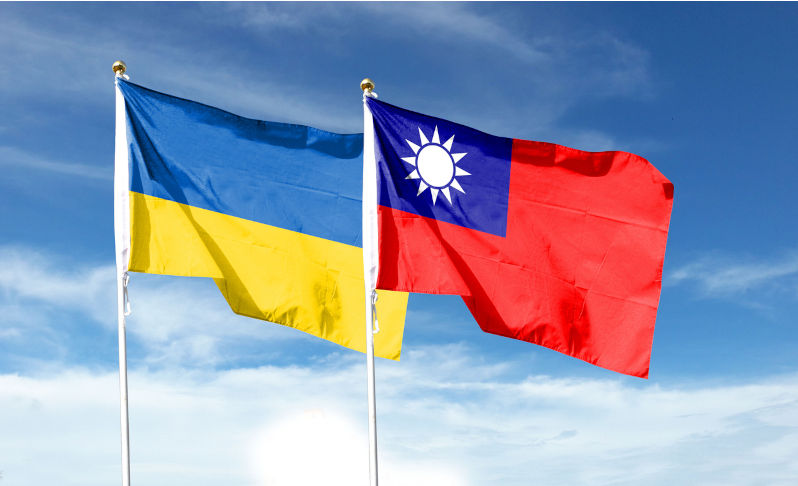Avoiding an 'exclusion' disaster in the Pacific – a different lesson from Ukraine
September 13, 2024
The most senior US officials, including President Joe Biden himself, refer to US alliances with individual or groups of countries in the Indo-Pacific as benign and defensive in nature. These references contrast with warnings about the possible “knock-on” effect of a Russian victory in Ukraine which, it is said, could encourage China to seek to incorporate Taiwan by force. However, an examination of the situation in Europe provides a different lesson for our part of the world; that is that building an alliance system which excludes the most important country in a region can have disastrous effects.
I refer, of course, to the war in Ukraine which, inspite of Ukraine having been part of the Soviet Union until its collapse, Russia — and Vladimir Putin in particular — came to see as “the tip of the NATO spear” pointed at it, with the aim of, and giving NATO the ability to, permanently relegate it to second-tier status.
There has been much discussion of whether the West deceived Russia over the possible future eastward expansion of NATO after the end of the Cold War and the re-unification of Germany. However, there is little doubt that at that time Russia was looking to full participation in a new Europe-wide, or Atlantic-wide, security organisation, but was snubbed. And years later, that led to Putin’s decision to invade Ukraine which has already had disastrous consequences for both Ukraine and Russia. We can only hope the disaster does not spread to involve the rest of Europe, or even the wider Western world. In hindsight, it would have been a much more positive course to fully involve Russia — the world’s second strongest nuclear power, resource-rich, technologically advanced, with a history of a major role in European affairs, including a much-admired role in World War II — in post-Cold War developments and arrangements including in the security sphere.
The same description and arguments apply to China in the Pacific. One linkage, commonly made by Western officials and commentators, is that a Russian victory in Ukraine would encourage China to invade Taiwan. But another lesson for the Pacific from the Atlantic is that it isn’t wise to try to construct a security system that excludes the major regional country. There’s no doubt that in the Pacific that is China, and indeed the US is paranoid about its rise. To quote University of Chicago Professor John Mearsheimer yet again, “the US cannot tolerate a peer competitor".
Some writers date the United States’ fear of China to 2008, when its economy remained strong while those of others faltered. Certainly, at some point, the US’s attitude to China changed, as has the attitude to the US of the Chinese public. Of course, all is not lost between the two, as shown by the recent visit of US National Security Adviser Jake Sullivan to Beijing, where he was reportedly given the highest level reception. But the emphasis often placed on the United States’ relationship with its allies like Japan, South Korea and the Philippines — and increasingly Australia, after the latest AUSMIN — tends in a different direction. Statements of purpose by American officials are full of phrases like “opposing China” and “curbing China’s rise”, and US Pacific diplomacy seems centred on building “mini-lateral” cooperation to confront China. Our government certainly seems to go along with this: for example, recent talks with Japan have foreshadowed exercises with both US and Japanese Marines in Northern Australia.
Yet what do we actually have in China? It can be described in much the same terms as Russia above – the world’s first or second largest economy, technologically advanced, a nuclear power, with a history as the central power of Asia and which, like Russia, played a much-admired role in World War II.
Internationally it is expanding its role and influence, as the just-concluded China-Africa meeting exemplifies – although it harms its international standing by what seem to an outsider to be unnecessary displays of assertive behaviour in the South China Sea. Its international relations are also haunted by the question of the status of Taiwan, which is the main issue left over from the major civil war in China 70 years ago. At least, a very recent Chinese formulation again included “peaceful” in its longstanding goal of reunification with Taiwan.
Multilaterally, China has been an active participant in both regional — the ASEAN Regional Forum, the East Asia Summit, the RECEP — and international — the UN, the WTO — bodies. In fact, it has frequently combined its activities in these bodies with the influence acquired from its active world-wide diplomacy to produce outcomes that were surprising — and sometimes unwelcome — to members of longer standing. But that is a result of competition, one of the principles on which the Western world prides itself, and which we can hardly condemn.
A distinguished recent visitor to Australia, former South Korean Foreign Minister Dr Kyungwha Kang, now president and CEO of the Asia Society, head-quartered in the United States, was interviewed on 7 September on Radio National. She said the US’ aim in relation to China should be “managed competition, plus dialogue”. She did not think China was expansionist, or aggressive. Indeed, it had a defensive mindset, being so dependent on imports from all over the world – an important element in its attitude to the South China Sea.
As we know, China is Australia’s most important customer and trading partner, a country with which we have a “comprehensive strategic partnership”. There is a strong people-to-people element in the relationship – students as well as permanent citizens. Senior Chinese have often made the point that Australia and China have no history of clashes to bedevil their relationship. It is, therefore, puzzling and regrettable to see that at the latest AUSMIN, as at its predecessors, the Australian side agreed to formulations whose only rationale is to better enable the United States to wage a war against China.
And, looking at it from a wider perspective, and with the lesson of NATO, Russia and Ukraine in mind, it is also unrealistic to pin our hopes for a secure, stable and prosperous Pacific on a grouping essentially consisting of the US, Japan, South Korea and the Philippines – as well as Australia, if we don’t disentangle ourselves from it. To do so is to ignore China’s central role in the Asia-Pacific, and the fact that most countries of Asia — India, for example — and of ASEAN — Indonesia and Vietnam, for example — don’t wish to take sides between the US and China. And see the views of the former Foreign Minister of South Korea, one if what the Americans call the “squad”, reported above.
“Involvement and engagement” should be our key words in relation to China, not “exclusion” or “containment”, as we seek to avoid a repetition of the Ukraine disaster in the Pacific.

